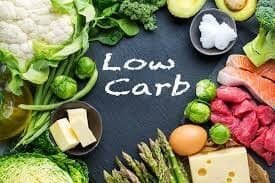A low-carb diet is a way of eating that restricts carbohydrates, such as bread, pasta, and rice. Instead, it focuses on protein-rich foods, such as meat, fish, and eggs, as well as non-starchy vegetables. Let’s know more below about low carb diet for beginners.
Low-carb diets have been shown to have a number of health benefits, including weight loss, improved blood sugar control, and reduced risk of heart disease.

If you are new to low-carb dieting, here is a comprehensive guide to help you get started:
What are the different types of low-carb diets?
There are many different types of low-carb diets, but they all share the same basic principle: restricting carbohydrates.
Some of the most popular low-carb diets include:
- Keto diet: The keto diet is a very low-carb, high-fat diet. It typically restricts carbs to 20-50 grams per day.
- Atkins diet: The Atkins diet is a low-carb diet that gradually increases the amount of carbs allowed over time.
- Paleo diet: The paleo diet is a low-carb, high-protein diet that is based on the foods that were eaten by our hunter-gatherer ancestors.
How to start a low-carb diet
If you are new to low-carb dieting, it is important to start slowly. A good way to do this is to gradually reduce the amount of carbs you eat each day.
You can also start by following a moderate-carb diet, which allows for 50-100 grams of carbs per day. Once you are comfortable with following a moderate-carb diet, you can gradually reduce the amount of carbs you eat to follow a low-carb diet.
What to eat on a low-carb diet
There are a variety of foods that you can eat on a low-carb diet. Some of the best foods to eat include:
- Protein-rich foods: meat, fish, eggs, dairy products, legumes, and nuts
- Non-starchy vegetables: leafy greens, broccoli, cauliflower, Brussels sprouts, and asparagus
- Healthy fats: avocados, olive oil, nuts, and seeds
Foods to avoid on a low-carb diet
There are a number of foods that you should avoid on a low-carb diet, including:
- Sugary drinks: soda, juice, sports drinks, and sweetened coffee and tea
- Grains: bread, pasta, rice, and cereal
- Starchy vegetables: potatoes, corn, and peas
- Processed foods: chips, candy, cookies, and crackers
- Fruit: fruit is high in carbs, so it should be limited on a low-carb diet. However, some low-carb fruits, such as berries, can be eaten in moderation.
Tips for following a low-carb diet
Here are some tips for following a low-carb diet:
- Meal plan ahead of time. This will help you to make healthy choices and avoid unhealthy foods.
- Cook at home more often. This gives you more control over the ingredients in your food.
- Read food labels carefully. Pay attention to the carb content of foods.
- Drink plenty of water. Staying hydrated is important for overall health and well-being.
- Don’t be afraid to ask for help. If you are struggling to follow a low-carb diet, talk to your doctor or a registered dietitian.
Food which can include in Low-carb Diet:
Poultry, Meat, Fish & Seafood
Salmon, Egg, Pork, Turkey, Chicken, Beef, Sardines, Albacore Tuna
Fruits & Vegetables
Spinach, Berries, Broccoli, Zucchini, Bell Paper, Green Beans, Culiflower etc.
Dairy Items
Butter, Cheese, Cottage Cheese, Heavy Cream, Plain Greek Yogurt, Sour Cream
Other
Dark Chocolate, Cocoa Powder, Alternative Flours, Olive Oil, Nuts & Seeds, Unsweetened and natural milk, Unsweetened Tea & Coffee etc.
Benefits of a low-carb diet
Low-carb diets have been shown to have a number of health benefits, including:
- Weight loss: Low-carb diets can help you to lose weight by reducing your calorie intake and increasing your metabolism.
- Improved blood sugar control: Low-carb diets can help to improve blood sugar control in people with type 2 diabetes.
- Reduced risk of heart disease: Low-carb diets can help to reduce the risk of heart disease by lowering cholesterol levels and blood pressure.
- Other health benefits: Low-carb diets have also been shown to improve brain function, reduce inflammation, and improve gut health.
Conclusion
Low-carb diets can be a safe and effective way to lose weight and improve your health. If you are considering starting a low-carb diet, be sure to talk to your doctor first to make sure that it is right for you.
Additional tips
Here are some additional tips for following a low-carb diet:
- Don’t be afraid to experiment with different foods and recipes. There are many delicious and low-carb foods
- Take help of nutritionist and doctor to decide and well plan your diet according to your body needs.
You may like our above article on low carb diet for beginners
Thanks for visiting Gymbag4u.com
You may also love reading our following articles whatis a keto diet and it’s planning – GymBag4U and A Beginners Guide to Keto Dieting for body building GymBag4U
